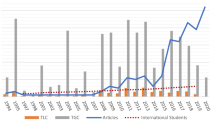Abstract
OECD figures (1998–2002) reveal a sharply increasing flow of foreign workers into European countries. Ethnic diversification has become a generalized matter of fact. At the same time, rapidly developing technology and ‘intellectual globalization’ processes—the world wide web—have also become a reality. This complex cluster of changes has an impact on the perceptions of the self and of the other. Multilayered belongings and paradoxical meanings enter into interethnic relations in sometimes most surprising and unpredictable ways from outside of the boundaries of local communities. But the developments also create new and very positive opportunities for education/schooling and social cohesion. The paper critically examines this changing context and also Europe’s educational responses to the new challenges: the European Socrates programme, the initiatives in the field of intercultural citizenship education and the issue of combating deprivation.
Similar content being viewed by others
Notes
Vertovec (2006) mentions ‘super-diversity’ as characteristic for the situation in European cities in the last decade, “a notion intended to underlie a level and kind of complexity surpassing anything previously experienced”. For a similar notion, see Miyares (2004) and the notion of ‘hyperdiversity’.
‘2004—e-learning me included—How to use e-learning as a tool for social inclusion’, see http://www.be-odl.org/images/res/_Toc97467133 (21 Aug 2006).
References
Anderson, B. (1983). Imagined communities: Reflections on the origins and spread of nationalism. London: Verso.
Appadurai, A. (1996). Modernity at large. Minnesota: University Press.
Barré, R., et al. (2003). Diasporas scientifiques. Scientific diasporas. Paris: IRD editions.
Barth, F. (1994). Enduring and emerging issues in the analysis of ethnicity. In H. Vermeulen & C. Govers (Eds.), The anthropology of ethnicity. Beyond ‘ethnic groups and boundaries’ (pp. 11–32). Amsterdam: Het Spinhuis.
Basch, L., Glick-Schiller, N., & Szanton-Blanc, C. (1995). Nations unbound: Transnational projects, postcolonial predicaments, and deterritorialized nation-states. New York: Gordon and Breach.
Baumann, G. (1999). The multicultural riddle: Rethinking national, ethnic, and religious identities. London: Routledge.
Bloom, B. S. (1956). Taxonomy of educational objectives: The classification of educational goals. New York: Longmans, Green.
Carling, A. (Ed.). (2006). Globalization and identity. Development and integration in a changing world. London: Tauris.
Castells, M. (1996). The rise of the network society. Oxford: Blackwell.
Coatsworth, J. (2004). Globalization, growth, and welfare in history. In M. Suarez-Orozco & D. B. Qin-Hilliard (Eds.), Globalization. Culture and education in the new millennium (pp. 38–55). Berkeley: University of California Press.
Council of Europe—Language Policy Division. (2004). European language portfolio (ELP). Principles and guidelines, with added explanatory notes (version 1.0). Council of Europe DGIV/LANG (2000) 33 rev.1. Revised in June 2004, 10 pp. Strasbourg: CoE.
De Coutere, B., Baten, L., & Viaene, S. (2006). 6C-learning: A pragmatic framework for 2nd generation e-learning projects. See http://www.6c-learning.org/. Accessed 21 Aug 2006.
Giddens, A. (1999). Runaway world: How globalization is reshaping our lives. London: Profile Books.
Grillo, R. D. (1998). Pluralism and the politics of difference: State, culture, and ethnicity in comparative perspective. Oxford: Clarendon.
Heyneman, S. (2003). Education, social cohesion, and the future role of international organizations. Peabody Journal of Education, 78(3), 25–38.
IBM. (2006a). Inspired: Real stories from government, education and health care. Accessed through www.ibm.com/learning. Accessed 20 Oct 2007.
IBM. (2006b). Learning infrastructure: Architecting a formal and informal learning environment. IBM Learning Solutions Executive Brief. Accesses through www.ibm.com/learning. Accessed 20 Oct 2007.
IOM. (2003). World migration 2003: Managing migration: Challenges and responses for people on the move. Geneva: IOM World Migration Report Series, 2.
King, R. (2002). Towards a new map of European migration. International Journal of Population Geography, 8, 89–106.
Luciak, M. (2004). Migrants, minorities and education. Documenting discrimination and integration in 15 member states of the European Union. Vienna: EUMC.
Miyares, I. (2004). From exclusionary covenant to ethnic hyperdiversity in Jackson Heights, Queens. Geographical Review, 94(4), 462–483.
OECD. (2004). Learning for tomorrow’s world: First results from PISA 2003. Paris: OECD.
OECD/SOPEMI. (2005). Trends in international migration. SOPEMI 2004 Edition.
Portes, A. (Ed.). (1998). The economic sociology of immigration. New York: Russell Sage.
Putnam, R. (2001). Bowling alone. New York: Simon and Schuster.
Reimer, J. (2005). Total share: 30 years of personal computer market share figures. Retrieved from www.arstechnica.com. Accessed 20 Oct 2007.
Robertson, R. (1992). Globalization. Social theory and global culture. London: Sage.
Shen, W. (2005). A study on Chinese student migration in the United Kingdom. Asia-Europe Journal, 3, 429–436.
Suarez-Orozco, M., & Qin-Hilliard, D. B. (Eds.) (2004). Globalization. Culture and education in the new millennium (pp. 1–37). Berkeley: University of California Press.
Vanlangendonck, M. (2002). Tourism as ethnic relations in Crete (Greece). An ethnographic outline. KOLOR, Journal on Moving Communities, Antwerp, 2, 61–76.
Vertovec, S. (2006). The challenges of super-diversity. EASA paper, September, abstract.
Xavier Inda, J., & Rosaldo, R. (Eds.). (2001). Introduction: A world in motion. The anthropology of globalization: A reader (pp. 1–34). New York: Blackwell.
Internet information
Eurostat databases: Student mobility (tp05_1 and tp05_3), Number of foreign students in tertiary education (ISCED 5-6) by level of education, programme destination and country of citizenship (isced 5_6).
Erasmus/Socrates Internet page: http://www.europa.eu.int/comm/education/programmes/socrates/erasmus/erasmus_en.html (01/03/2006).
Author information
Authors and Affiliations
Corresponding author
Rights and permissions
About this article
Cite this article
Leman, J., Trappers, A., Brandon, E. et al. Migration Related Socio-cultural Changes and e-Learning in a European Globalising Society. Stud Philos Educ 27, 237–251 (2008). https://doi.org/10.1007/s11217-007-9073-z
Published:
Issue Date:
DOI: https://doi.org/10.1007/s11217-007-9073-z




